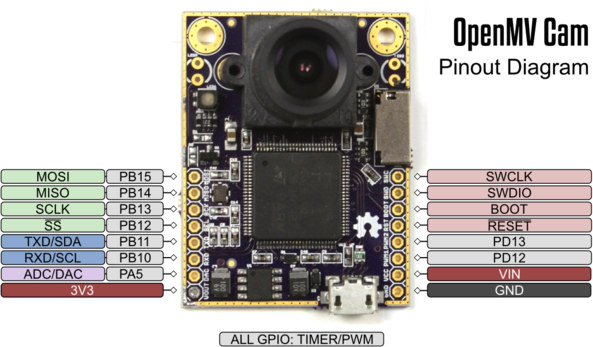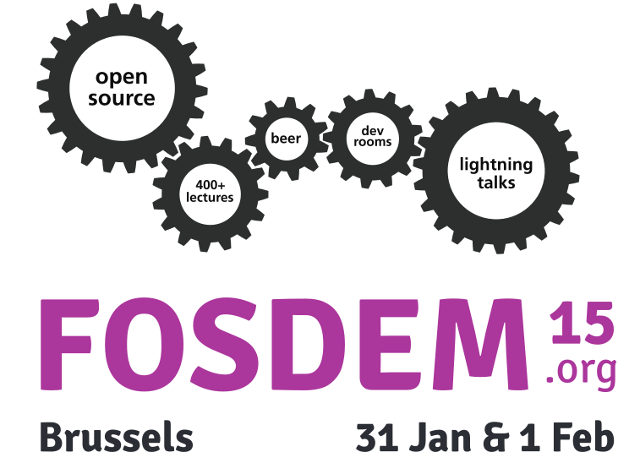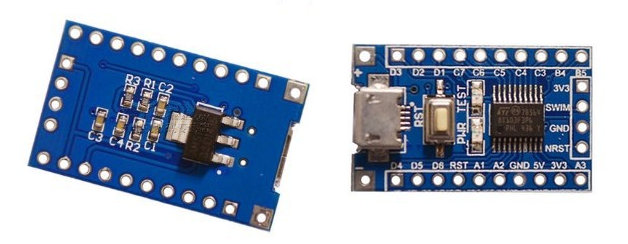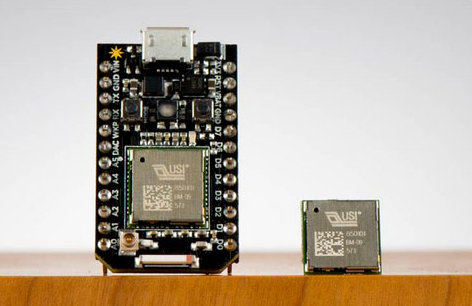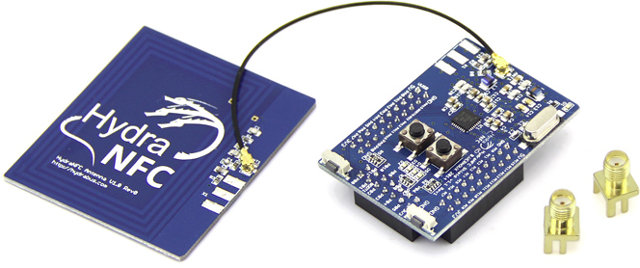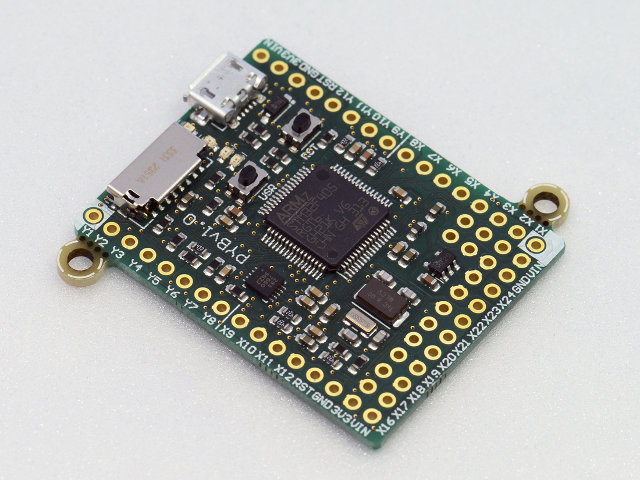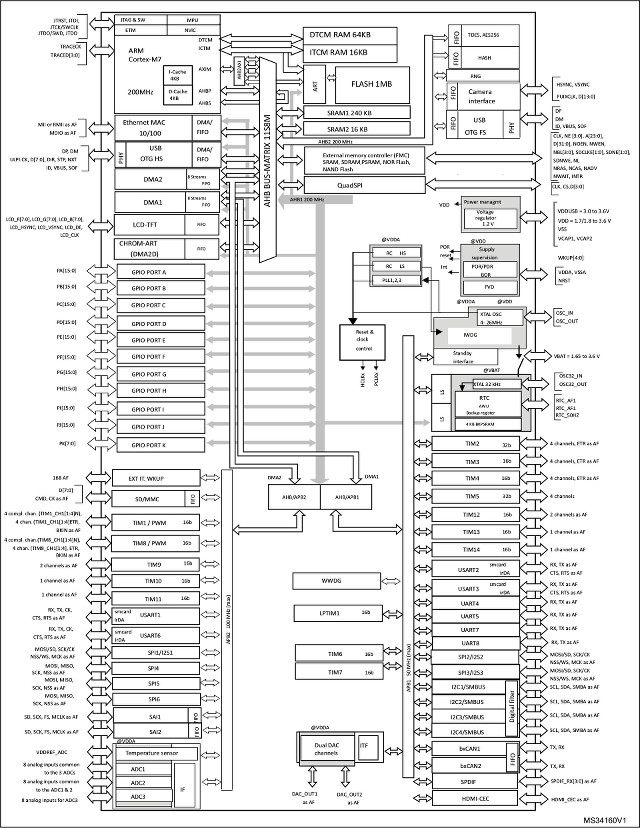Recently I’ve seen some activity about tiny cameras for makers, including Linux based SinoVoIP BPI-D1 recording up to 720p30 videos, and an upcoming mini camera for VoCore Wi-Fi module. There’s now another project called OpenMV, and open source camera for machine vision applications based on STMicro STM32, recording up to VGA resolution at 20 fps, and controlled using Micro Python scripts. OpemMV camera specifications: MCU – STM32F427, 180MHz, 225 DMIPS, 256K SRAM, 2M Flash, DMA/FPU/DSP/DCMI/SDIO/2D Acceleration Camera – 2MP OV2640 sensor with interchangeable M12 lens, 2x IR LEDS Storage – uSD interface: SDIO (4-bit mode) Expansions – 2x headers with USART, SPI, I2C, PWM, ADC/DAC, GPIOs, PWM and power signals USB – micro USB 2.0 Full Speed port Power Supply – 5V via USB; Current draw is approximately 140mA, steady state Dimensions – 4.57 x 3.56 cm The camera can be controlled using (Micro) Python scripts. with the project’s OpenMV […]
FOSDEM 2015 Schedule – January 31 – February 1 2015
FOSDEM (Free and Open Source Software Developers’ European Meeting) takes place every year during the first week-end of February. This year the developer-oriented event expects to bring over 5000 geeks to share ideas and collaborate on open source projects. Contrary to most other events, it’s free to attend, and you don’t even need to register, just show up. FOSDEM 2015 will take place on January 31- February 1 in Brussels. There will be 551 sessions divided into 5 keynotes, 40 lightning talks, 6 certification exams, and with the bulk being developer rooms and main tracks, divided into 7 main tracks this year: Languages, Performance, Time, Typesetting, Hardware, Security and Miscellaneous. I’m not going to attend, but it’s still interested to see what will be talked about, and I’ve concocted my own little virtual program out of the main tracks and developers’ rooms. There’s a few minutes overlap between some talks […]
Meet STMicro STM8S Based One Dollar Development Board
ESP8266 modules are $3 Wi-Fi boards targeting IoT applications that can be used in standalone mode, or connected to another MCU based board. But what if you don’t actually need Wi-Fi, but instead require a tiny board to control a few GPIOs? Arduino Pro mini can be used for this, but it costs about $10 on Sparkfun, and it’s certainly cheap enough for most projects. Switching to Aliexpress, you can get Arduino Pro mini clones for about $2, and a bit less in 10 pieces quantities. But you can get even cheaper and add a micro USB port with STMicro STM8S based boards that can be found for 5.5 CNY (Less than $1) on Taobao.com, or – once oversea shipping is factored in – about $1.60 to $1.70 on BuyInCoins, or Aliexpress without headers, and the version with headers sells for about $2 or more. Let’s check the board specifications: […]
Spark Photon is a $19 Hackable IoT Wi-Fi Board
Spark Core is a popular Wi-Fi module for the internet of things with a community of over 20,000 developers, but at $39 it may have started to feel a little expensive compared to the new IoT Wi-Fi modules such as ESP82666 or xWiFi, so the company has unveiled a new Wi-Fi board called Photon that’s smaller, better, and cheaper. Let’s compare Spark Core with the new Spark Photon. Feature Spark Core Spark Photon Wi-Fi Support 802.11 b/g 802.11 b/g/n Wi-Fi Setup Smart Config Soft AP Wireless Module TI CC3000 Broadcom BCM43362 MCU STM32F103 STM32F205 MCU Speed 72 MHz 120 MHz Flash Memory 128 KB 1 MB RAM 20 KB 128 KB GPIO 18 UART (Serial) Yes JTAG Yes I2C Yes SPI Yes ADC Yes DAC No Yes CAN No Yes VBAT pin exposed No Yes Wakeup pin exposed No Yes Price $39.00 $19.00 So beside slashing the price by 50%, […]
STMicro STM32F4 (Cortex M4) vs STM32F7 (Cortex M7) Graphics Demo
STMicro announced their latest STM32F7 micro-controller family based on ARM Cortex M7 last week. As ARM Techcon 2014 is now taking place, the company has uploaded an infomercial on their YouTube account, where STMicro and ARM representatives are interviewed about the new family, and talk about its performance, power consumption, target applications, business prospects, and so on. But there’s also an a short demo with two development kits one with a STM32F4 cortex M4 micro-controller, and the other with a STM32F7 micro-controllers. Since both MCU families are pin-to-pin compatible, the hardware is identical except for the MCU. Both kits are pre-loaded with a 3D graphics demo (ray tracer), and the board with STM32F7 completes the demo in about half the time of the one with STM32F439, allegedly with about the same power consumption (7 coremarks / mW). The video is about 8 minutes long, and the demo starts at 1:25. […]
HydraBus is an Open Source Hardware STM32 Devkit with Support for NFC via HydraNFC Shield
Recently, I wrote about the public availability of a MicroPython board based on STMicro STM32F4 Cortex M4 support that can easily be programmed with Python. It turns out there’s another STM32 board called HydraBus, also supporting Micro Python firmware, or another embedded firmware based on ChibiOS, together with an optional HydraNFC shield capable of sniffing, reading/writing or emulating any 13.56MHz NFC tags. HydraBus Specifications: MCU – STMicro TM32F405RG micro-controller @ 168 MHz with 1MB flash, 192KB SRAM, and an FPU. External Storage – Micro SD card slot up to 48MHz (~24MB/s) Expansion Headers – 4 headers with access to 44 I/Os (some already used by micro SD and USB 1 & 2). USB – 2x micro USB connector including 1x OTG port, and 1x device/host port, both with ESD protection. Misc – Reset and user button, user LED, Power – 5V via micro USB port. Dimensions – 60mm x […]
Pyboard MicroPython ARM Cortex M4 Board is Now Available for $45
MicroPython is both a lightweight implementation of Python 3.4 programming language, and a board, aka pyBoard, based on STMicro STM32F4 ARM Cortex M4 micro-controller running Micro Python. The project had a successful Kickstarter campaign in 2013, and they’ve completed shipment of the perks to their backers last June. The company has now launched its own store, so let’s see the progress of the project. The board has been re-designed since Kickstarter campaign, but the specifications remains the similar, but with some extra I/Os exposed: MCU – STMicro STM32F405RG micro-controller @ 168 MHz with 1MB flash, 192KB RAM, and an FPU. External Storage – Micro SD card slot, supporting standard and high capacity SD cards Expansion Headers: 24x GPIO on left and right edges and 5x GPIO on bottom row, plus LED and switch GPIO available on bottom row 3x 12-bit analog to digital converters, available on 16 pins, 4 with […]
STMicro STM32F7 Series is the First ARM Cortex-M7 MCU Family
Right after ARM’s Cortex-M7 announcement, STMicro has listed STM32F7 MCU family based on the latest ARM core on their website. The family is comprised of 20 different MCUs with various flash size, packages, and with or without a crypto/hash coprocessor. The company expects their STM32F756xx microcontrollers to be used for motor drive and application control, medical equipment, industrial applications such as PLC, inverters, and circuit breakers, printers & scanners, alarm systems, video intercom, HVAC, home audio appliances, mobile applications, Internet of Things application, and wearable devices such as smartwatches. STM32F7 MCUs share the following key features: Cortex-M7 core @ 200 Mhz (1000 CoreMark/428 DMIPS) with L1 cache (4KB I-cache, 4KB d-cache) 320KBytes of SRAM with scattered architecture: 240 Kbytes of universal data memory a 16 Kbytes partition for sharing data over the bus matrix 64 Kbytes of Tightly-Coupled Data Memory (DTCM) for time critical data handling (stack, heap…) 16 Kbytes […]


